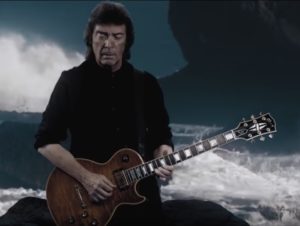
Every since The Who released Tommy [1969], I have been obsessed with rock music deployed in the service of larger concepts. I adored rock and roll, of course, and I loved the fact some artists smacked down any notion that rock should stay in its lane and make music for kiddies at sock hops (or, at its scariest for parental units, provide soundtracks for leather-jacketed thuggery a la Link Wray’s “Rumble”).
I grew up in a time where rock music truly seemed to change the world order—the Summer of Love, civil rights, women’s rights, the Vietnam War, Woodstock, and so on and so on. Artists who endeavor to take risks and devise grand musical concepts—and even cautionary tales for those who will listen—always get a huge salute from me, and I respect the creativity and thought behind every concept album I’ve heard, from the rather nutty (Music From “The Elder” by Kiss, anyone?) to the near sublime (American Idiot by Green Day, The Wall by Pink Floyd, Quadrophenia by the Who, Abandon All Hope by Gretchen Menn, and many others).
So I was thrilled when former Genesis guitarist Steve Hackett dropped At the Edge of Light [Inside Out Music]—a broad, multi-textured, and absolutely thrilling work about dread and hope in our current time. The album is simultaneously a call-to-arms, a warning shot, a hippie-Utopian vision, a slayer of mistrust and divisiveness, a bringing together of the world community, and a beam of Truth—and all wrapped up in transcendent, emotionally ass-kicking guitar playing and wonderfully crafted songs.

Hackett is obviously stratospheres beyond me as a conceptual artist, composer, and guitarist, but we do share the same dream that rock music can shock, challenge, and possibly change global society. Here are some of Hackett’s own thoughts on the power of music…
Collaborating with World Musicians
“Once you start collaborating with all these different musicians from different places,” says Hackett, “you realize that music can do things that politics appears unable to achieve. In direct contrast to populist politics, nationalism and all the rest, musicians work tirelessly ignoring borders and differences. We celebrate opposites and try to fuse them together in order to have happy accidents and collisions of ideas.”
The Album as an Art Form
“I think of an album as a journey, and I love albums because I think they are, at best, agents for transformation. We are in a post-Sgt. Pepper’s world at the moment, but when the Beatles released that album in 1967, suddenly there was no such thing as the mainstream. Suddenly, India was as relevant to the commercial success of that very broad-based album as anything else. Most of the ideas on Sgt. Pepper’s Lonely Hearts Club Band were like musical cameos, and I keep coming back to that model. I was a humble guitar player when I heard that album—an aspiring one—but the celebration of details was not lost on me.”
No Borders
“Today, there is a frightening sense in which we could retreat to our own countries, forget about the welfare of others, and hide once more in caves. If that is allowed to happen, then we become isolated from one another in a way that means the whole future of humanity is put at risk. I have always wanted to reach out as an artist to anyone from anywhere. I love the whole global perspective that means it never matters where you are from. If you are good enough, then that’s all people should be concerned about.”
A Force for Good
“Music did change the world, and we can’t forget that. I hope it can do it again, and for the better. I’ve said it before, ‘Music is one of the greatest medicines in the world!'”
My complete interview with Steve Hackett will be published in the April 2019 issue of Guitar Player magazine.






Well… now I have to find this LP and check it out. Thanks for the heads-up. This wasn’t on my radar at all.